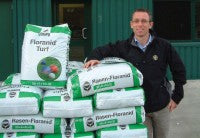What's in the bag?
In your everyday life you would know if you ordered a VW Golf GTI and were delivered a Hyundai Getz - that's not only brand recognition, but an understanding about quality and how it varies between manufacturers. If this happened to you, you'd complain and send it back and make sure you were supplied what you ordered.
 If this is so, why, in our working lives, do we accept products which do not live up to the original description? Like, for example, when you purchase an amenity grass seed mixture. Do you really know, or check, that you are being delivered what you ordered?
If this is so, why, in our working lives, do we accept products which do not live up to the original description? Like, for example, when you purchase an amenity grass seed mixture. Do you really know, or check, that you are being delivered what you ordered?
In the car analogy, you pick the brand depending on the level of quality and overall value for money you want. You then have to take it on face value that the car will be built with the right engine, gearbox and additional gizmos, and that it will perform as expected.
It's very much the same when choosing grass seed mixtures - all down to the quality of the components, or cultivars.
We all know that seed breeders and seed companies go to great lengths to produce new cultivars which bring end users improved performance. Much is available from the various suppliers about the quality of their seed, enough for anybody to make an informed decision about the company one would want to do business with.
But, is it so well known that each new cultivar takes 15-20 years from its conception to being commercially available?
Then, there are the impartial trials and comparison against other cultivars that are independently conducted by the STRI, and the compulsory EU registration and listing on the European Common Catalogue before they are able to be used legally. Without all that you wouldn't be able to be sure about the performance of the final mixture.
So, why would anybody consider a variety that didn't appear in the European Common Catalogue or had been independently tested by the STRI? In truth, they probably won't by choice, but they could do so by default.
Seed suppliers construct their mixtures well in advance of a growing season. They carefully select the cultivars available to them, matching them up to the application in mind. They then hope that the harvest will live up to the likely demand - if it doesn't, they make sure that any cultivar substitution is of a similar type and quality to the original choice.
Only this way can the groundsman or greenkeeper be assured that what he ordered will give him the desired end result. However, not all seed suppliers are that scrupulous.
This need to substitute on the grounds of short supply of the chosen cultivar is not uncommon, but it has also been known for substitutions to be made because of price. Those unscrupulous seed suppliers alluded to would not blink at sliding in the odd 'American' cultivar - much cheaper, even though they don't meet up to the standards required for the UK market.
Some might say that a UK standard isn't everything but, how can anybody be sure that a grass bred for North American conditions will perform well in a completely different climatic setting? That's when the STRI testing and the European Common Catalogue come to the fore, giving the data needed to make an informed decision.
So, you've done your homework and settled on the mixture, now all you have to do is make sure it's supplied with the right cultivars.
Firstly, take a good look at the bag; does it carry an official 'Green' Department of Environment, Farming & Rural Affairs (DEFRA) label? With food labelling, you expect your breakfast cereal box to list what it contains - it's the same for grass seed mixture. The content must be listed by cultivar, species kind and percentage breakdown. If the label doesn't list the cultivars you were expecting, consult the STRI listings to see if the substitutions appear in their tables. And, if they do, are they as good as the originals? If they don't, it's quite likely that the mixture will not give you the results required and you should reject the delivery.
DEFRA licensed seed testing stations, like the one at British Seed Houses Ltd., can be audited at any moment in time to verify that what is described on the mixture label, is actually what is going in the bag. Unfortunately, DEFRA do not have the resources to police everyone and a less scrupulous business may not always provide you with what they say they are, but you can overcome that by considering the supplier in the first place in much the same way as you would when choosing that car!
Some seed suppliers go further. Although not a legal requirement, all seeds at BSH are tested every six months to ensure their viability. The company states its aim as bringing continual improvement for turfcare professionals, and, to that end, its Grade 'A' mixture ranges only use the very latest cultivars available.
In addition to using good cultivars, mechanical purity and germination are just as important, which mean the turfcare professional can be confident of its performance for a given application.
